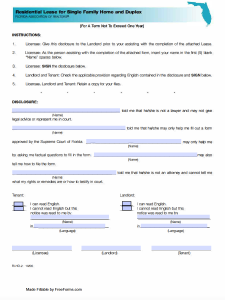
The Florida lease agreement is a legal document that is introduced during the exchange of rights pertaining to the use of a real estate property. The conveyor (lessor) and the occupant (lessee) must come to an accord on the basic terms of the agreement, such as the rent, security deposit, and duration of the tenancy. Certain provisions can be listed within the contract to customize the arrangement to fit the needs of both parties. Once the document had been prepared, the lessee should read it thoroughly before providing their signature.
Rental Application – Paperwork apportioned to an interested party wishing to be considered as a tenant of a leased residence. The form allows the possible tenant the opportunity to prove qualification to rent and the landlord necessary background information to make a decision as to the applicant’s eligibility.

Florida Association of Realtors Residential Lease for Single Family Home and Duplex – The Florida Association of Realtors has created a specific form to be used for leases involving a single-family home or duplex. The document contains information on the lease and the associated parties.
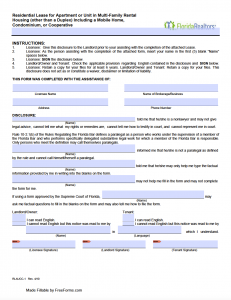
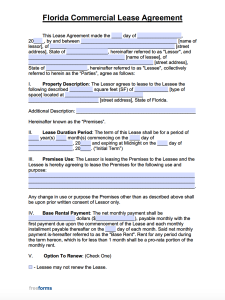
Commercial Lease Agreement – Specific to property that will be used to facilitate a company’s business operation.
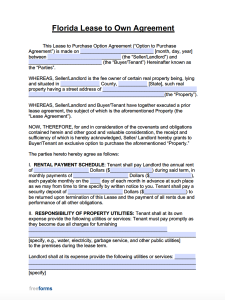
Lease to Own Agreement – If the renter would like the right to purchase the property during the term of the contract, this lease can effectively provide that option.
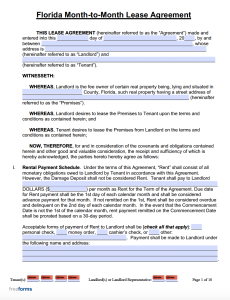
Month-to-Month Lease – For landlords/tenants who prefer not to enter into a long term obligation, this lease provides both parties with the ability to terminate the contract during any given month as long as fifteen (15) days’ notification is supplied before the end of the tenancy (§ 83.57(3)).
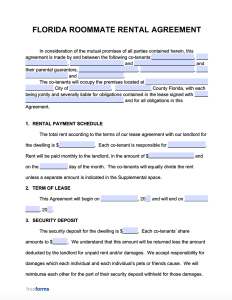
Roommate Agreement – A contract that details the arrangement made between a current tenant and an individual looking to occupy a shared living space.
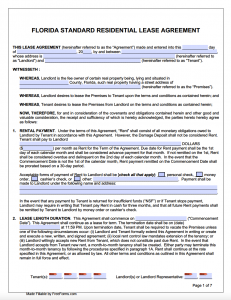
Standard Lease Agreement – Testifies to the associated provisions and responsibilities put forth within a transaction lease a rental unit. The official form records the commitment to define the arrangement.
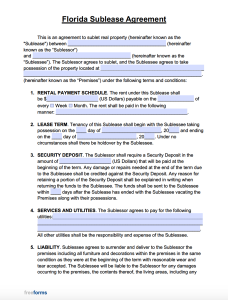
Sublease Agreement – Provides the ability for a current tenant listed on the lease of a property to “sublet” the premises to a third-party renter.
All statutes related to Florida’s legislation regarding the necessary protocol that needs to followed by lessors and lessees of residential property can be found under Title VI, Chapter 83: Landlord and Tenant – Part II – Residential Tenancies. The FDACS (Florida Department of Agriculture & Consumer Services) offers a Landlord/Tenant Law Brochure that condenses all the essential information that one would need to know when entering into a contract to rent/lease a property.
Landlord’s Address (§ 83.50) – The lessor (or an authorized agent representing the lessor) must disclose in writing their name and address within the content of the lease agreement.
Lead-Based Paint (42 U.S. Code § 4852d) – All lease/rental agreements for residential homes (built prior to 1978) shall contain a disclosure stating the harms and possible effects of lead-paint exposure, as well as any documentation concerning actual lead-paint hazards contained within the property.
Radon (§ 404.056(5)) – Every rental agreement within the state of Florida must include the following statement concerning radon gas:
“RADON GAS: Radon is a naturally occurring radioactive gas that, when it has accumulated in a building in sufficient quantities, may present health risks to persons who are exposed to it over time. Levels of radon that exceed federal and state guidelines have been found in buildings in Florida. Additional information regarding radon and radon testing may be obtained from your county health department.”
The tenant must pay rent at the time and location described within the lease agreement (§ 83.46). The state does not enact a specified grace period.
Late fees for overdue rent should be established within the lease agreement prior to the occupancy. Both parties should come to an agreement on the amount prior to signing as the state does not impose a maximum charge.
A landlord who receives a bounced check has the right to charge the tenant a service fee of:
(in accordance with § 68.065)
Florida does not enforce a limitation on the security deposit amount a lessor can ask for when renting a property. This should be discussed and agreed upon before signing any contract. (The standard is typically 1-2 months’ rent.)
The landlord of the property is obligated to furnish the tenant with the funds held for the security deposit within fifteen (15) days of moving out/concluding the agreement. If the landlord feels they need to subtract funds from the deposit due to damages or unpaid rent, they must send a written statement containing an itemized list within thirty (30) days of the termination of the contract. Tenants will have fifteen (15) days from the time of receiving the notice to object, otherwise, the deductions will be considered valid and the tenant will receive whatever funds remain (§ 83.49).
Before entering the premises of a tenant, a landlord must first provide the occupant with twelve (12) hours notice and only visit between the hours of 7:30 a.m. and 8:00 p.m. (§ 83.53(2))